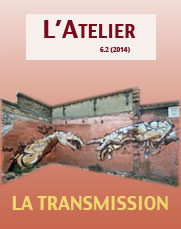Basil Bunting et les métamorphoses de la transmission
Mots-clés :
Bunting, Pound, MacSweeney, north, poetry, transmissionRésumé
Cet article cherche à définir le concept de transmission en analysant les relations entre maître et disciple qui furent au cœur des deux moments de grande activité poétique de Basil Bunting, les années 1920-1930, pendant lesquelles il se nourrissait des préceptes d’Ezra Pound, et les années 1960-1970, quand il devint à son tour une figure de proue du British Poetry Revival et un professeur de poésie invité aux Etats-Unis pour faire des conférences sur l’art poétique. Le concept de transmission est comparé à celui d’influence tel qu’il a été développé par Harold Bloom afin d’en montrer les différences : alors que l’influence concerne des contenus, la question de la transmission s’intéresse aux positions par rapport à ces contenus. Cela signifie que la transmission a partie liée avec le problème de l’autorité, position remise en cause au XXème siècle. Plutôt que de parler d’une crise de l’autorité qui s’accompagnerait d’une crise de la transmission, nous préférons avancer l’hypothèse que le questionnement grandissant de la notion d’autorité amène à une redéfinition de la transmission, non plus conçue comme verticale mais horizontale, non plus comme série de dogmes assénés mais comme espace de parole. Car chez Bunting, tout est affaire de sons et d’espace et il contribua grandement à décomplexer les jeunes poètes locaux aux accents Geordie. L’article se clôt sur le pouvoir métamorphique de la transmission.
The article is an attempt at defining the concept of transmission by analysing the relationships between master and disciple that were at the heart of Bunting’s two periods of intense poetic activity, the 1920s-1930s, when he followed Ezra Pound’s instruction, and the 1960s-1970s, when he became instrumental in the British Poetry Revival and was invited to the United States to teach the art of poetry. The concept of transmission is compared and contrasted with that of influence as it was developped by Bloom so as to shed light on the differences between the two: while influence is all about what is being transmitted, transmission deals with how something is passed on and who the master and the disciple are. This means that transmission is connected with authority, a position if not discarded, at least criticized in the 20th century. But instead of speaking of a crisis of authority that would have endured a crisis of transmission, we would rather say that transmission is being redefined: it is no longer vertical but horizontal, no longer about giving rules from above but about opening a space where ideas can circulate freely. Indeed for Bunting what matters is sound in space and part of his heritage is that he helped young Geordie poets be proud of their local accents. This leads to stating the transfiguring power of transmission.
Publiée
Numéro
Rubrique
Licence
-
L’envoi spontané d’un article à la rédaction de L’Atelier implique l’autorisation de publication et la cession des droits dans les limites établies par la loi de propriété intellectuelle.
-
L’Atelier conserve les droits de reproduction des articles publiés, quelque soit le support : internet, CD ROM, réimpression, photocopie, etc.
-
L’auteur conserve le droit de publier ultérieurement son article déjà paru dans L’Atelier avec la seule obligation de mentionner le nom de la revue comme source de la première publication.


